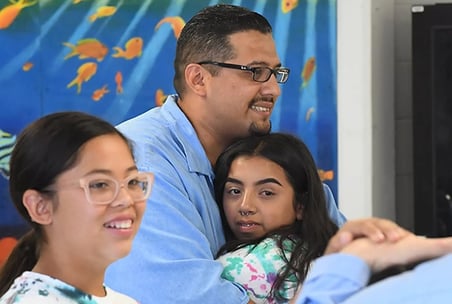Five days of grace for dads incarcerated at Salinas Valley State Prison
5 min read
Date Published: 08/09/2018
Last Updated: 08/09/2018
National Fatherhood Initiative Blog / Latest Articles
5 min read

We're pleased to bring you this article featuring Salinas Valley State Prison, an NFI partner who, along with the GEO group, has offered the InsideOut Dad® Program to fathers in their facility for several years.
Like most parents of a 13-year-old girl about to start her freshman year, Rudolph Ellis, 34, has concerns about his daughter Taniya Ellis.
Is she ready for high school? After all, she wants to grow up to become a prosecutor.
What about boys? Will she fall in with the wrong crowd, like he did?
"Gangbanging: It leads to the cemetery or prison," said Ellis, an inmate at Salinas Valley State Prison, on Friday at Camp Grace.
The week-long program allows incarcerated fathers to spend each day with their children.
They do more than just play games, do arts and crafts and sit down for meals together, though. They throw a party for all the birthdays missed and hold nightly discussions on the pain of having incarcerated loved ones, said Karen McDaniel, executive director of Place4Grace, which organizes Camp Grace.
She's keenly familiar with that pain—she founded Place 4 Grace because her husband is incarcerated, McDaniel said.
'I was parched'
On Friday, the children and their fathers showed off murals they'd made envisioning "a perfect day with dad."
For Evan Freeman Jr., 9, that meant playing catch.
"I don't think me and my dad had played catch before until this year," Freeman Jr. said.
His father, Evan Freeman Sr., said he's been in prison since Oct. 17, 2012.
For their "perfect day" mural, Taniya Ellis and her father, Rudolph Ellis painted him attending her high school graduation in four years—she just finished eighth grade this year.
"She's been making me proud. She's going to attend University High, going to be in honors classes," said Ellis, who himself has a 4.0 GPA as he pursues a degree in business, though he's been considering changing his major to psychology or sociology.
Ellis was one of three dads at Salinas Valley State Prison's first Camp Grace in 2017, McDaniel said.
The other participants had been transferred or paroled since then, she said.
The camp is free for the kids and paid for with a CDCR Innovations grant for about $30,000, she said. They've held six such camps, two of them at Salinas Valley, and would like to expand, she said.
"We're on camp no. 6. We'd like to be on no. 60," she said. "We'd like to see camps in every single prison in California."
Both Ellis and Freeman Sr. agreed: Camp Grace was like "bringing water to a man in the desert," Freeman Sr. said.
"I was parched," he said.
Only a select few
To participate in Camp Grace, inmates must be discipline-free for at least a year beforehand, McDaniel said.
One mistake is enough to lose out on a week with their children, said Lt. Eduardo Mazariegos with the prison, which has about 3,100 inmates.
That means Camp Grace is an incentive to behave for inmates at Salinas Valley State Prison, which houses some of the highest security-risk prisoners.
"It would be awesome if we could do this once a month," Mazariegos said.
But avoiding trouble isn't easy on the inside, Ellis said.
"It means swallowing your pride," he said. "It's not worth it. If I see somebody wanting to be a knucklehead, I have to stay away."
Camp Grace doesn't diminish the crimes committed, Mazariegos said, such as Ellis' assault with a deadly weapon and murder convictions. Instead, giving them time with their kids helps in the rehabilitation process, he said.
It also helps the children deal with the stress from their father's incarceration by meeting other kids in the same situation, McDaniel said.
"Trauma carries its own shame. Kids carry the shame of what their fathers committed," she said. "... They've grown up inside of a prison visiting room."
She'd founded Place4Grace in 2009 after seeing how important dealing with that stress was for her own children, Maya, 11, and James, 14. Their father and her husband is incarcerated for robbery, she said.
'Forever and a day'
Before Freeman Sr. found out he would be participating in Camp Grace, he hadn't shaved or cut his hair in a year, he said.
On Friday, he was sporting a trim haircut and beard.
Freeman Sr. said he's loved every minute with his young son but made sure to show him photographs of them together before prison.
"My favorite part is being able to show my son I haven't always been gone," he said. "Also, how witty he is. He's pretty sharp."
For Freeman Jr., getting time with his dad, whom he hadn't seen since Father's Day, was his favorite part.
"It meant a lot to me," he said.
That, and beating his dad at a dance competition, Freeman Jr. said.
"I think I need a recount," Freeman Sr. replied jokingly, before teasing him about winning at touch-football.
"I was tired," Freeman Jr. retorts, noting he'll be able to beat his dad at the Madden football video game "when you come back."
Freeman Jr. said he probably won't see his dad until he visits from Carson next Father's Day.
Though Freeman Sr.'s case is being appealed, he won't be eligible for parole until October 2037, when he'll be 67-years-old, according to CDCR.
Or, as he describes it, "forever and a day."
'We look back a lot'
But Friday carried an emotional undercurrent—it was the last day of Camp Grace.
"I don't think of it as saying goodbye. I feel like the week has gone by so fast. I said I won't cry, but I probably will," Taniya said.
"I'll probably cry too," her father said.
After Camp Grace wraps up, the kids leave to return home, said McDaniel with Camp4Grace.
"The dads walk us to the door, put their hands on the glass and watch every last step as we leave the building. They run out and put their hands on the fence and shout goodbye," McDaniel said. "It's hard and it's difficult and we look back a lot."
Rudolph Ellis is hoping to fulfill his daughter's "best day" mural—he's eligible for parole in 2021 thanks to recent legislation concerning life sentences for those who committed their crimes in their youth.
Rehabilitation is one reason why Camp Grace is so important, McDaniel said.
"Most dads coming here will be going home one day," McDaniel said.
 This article was originally published by The Californian and was reposted with permission.
This article was originally published by The Californian and was reposted with permission.
Joe Szydlowski is a reporter and writer for Record Searchlight.
jsydlowski@thecalifornian.com or 831 235-2360.
Date Published: 08/09/2018
Last Updated: 08/09/2018
Download the ebook to learn how to create fatherhood initiatives that engage every sector of community life.

Train Your Staff
Fatherhood Programs
Fatherhood Data
© 2025 National Fatherhood Initiative®. All rights reserved.